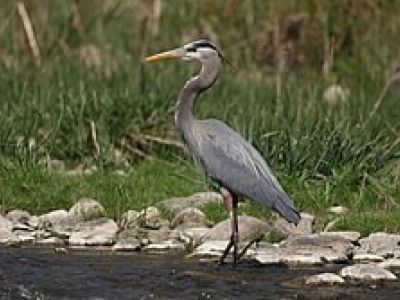B-GBHE-HE-Great Blue Heron, Herodias Subspecies

Great Blue Heron, Herodias Subspecies
Ardea herodias herodias
- Phylum: Craniata
- Class: Aves
- Order: Pelecaniformes
- Family: Ardeidae
The great blue heron (Ardea herodias) is a large wading bird in the heron family Ardeidae, common near the shores of open water and in wetlands.
General Information
Key Habitat Features
Nest and forage along margins of lakes, slow moving rivers, sloughs, marshy lakes and wetlands), lowland riparian forest.
The same nest structure may be used year after year.
Colonies occur in contiguous forest, fragmented forest and solitary trees, and nests are located close together.
Foraging areas are required within 10km of the breeding location.
Objectives
Minimize disturbance during the breeding season.
Maintain nesting habitat throughout all seasons.
Maintain desired plant communities and key habitat features.
Planning and Operational Measures
All Activities
Identify key habitat features using appropriate measures (i.e. QP direction, desktop review, field confirmation, etc) and plan activities within the operating area accordingly.
Time works such that they occur outside of the critical timing window.
Apply the appropriate survey and setback requirements for WHFs within identified habitat. (Refer to section 1.9 of the EPMG for additional guidance on WHFs).
All Activities
Undertake construction and operation of oil and gas activities in a manner that minimizes impacts to desired plant communities and key habitat features.
Avoid draining, altering or filling wetlands in proximity to heron colonies.
Timing considerations when working within identified habitat:
In rural areas, no activity within 500m of nest/roost between Feb 15 to August 31, when nesting and fledging occurs, and no activity within 300m at other times (September 1-February 14).
In urban areas, no activity within 400m of nest/roost between Feb 15 to August 31, when nesting and fledging occurs, and no activity within 200m at other times (September 1-February 14).